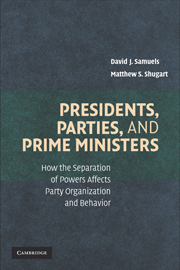 Presidents, Parties, and Prime Ministers
Presidents, Parties, and Prime Ministers Book contents
- Frontmatter
- Contents
- Preface and Acknowledgments
- Presidents, Parties, and Prime Ministers
- 1 Introduction
- 2 Political Parties in the Neo-Madisonian Theoretical Framework
- 3 Insiders and Outsiders
- 4 Constitutional Design and Intraparty Leadership Accountability
- 5 Electoral Separation of Purpose within Political Parties
- 6 The Impact of Constitutional Change on Party Organization and Behavior
- 7 Parties' “Presidential Dilemmas” in Brazil and Mexico
- 8 Presidents, Prime Ministers, and Mandate Representation
- 9 Conclusion
- References
- Index
1 - Introduction
Published online by Cambridge University Press: 05 June 2012
- Frontmatter
- Contents
- Preface and Acknowledgments
- Presidents, Parties, and Prime Ministers
- 1 Introduction
- 2 Political Parties in the Neo-Madisonian Theoretical Framework
- 3 Insiders and Outsiders
- 4 Constitutional Design and Intraparty Leadership Accountability
- 5 Electoral Separation of Purpose within Political Parties
- 6 The Impact of Constitutional Change on Party Organization and Behavior
- 7 Parties' “Presidential Dilemmas” in Brazil and Mexico
- 8 Presidents, Prime Ministers, and Mandate Representation
- 9 Conclusion
- References
- Index
Summary
In every pure parliamentary system a vote for any particular legislator – or for the party's list – is indirectly a vote for that party's leader as candidate for prime minister. In a sense, a “perfect correlation” exists between that party's votes for executive and legislative candidates. Yet in systems with popularly elected presidents, parties cannot take for granted the automatic alignment of the electoral bases of their executive and legislative “branches.” Indeed, the notion of presidential coattail effects – well known to even casual observers of elections in presidential democracies – suggests that in such systems parties expect variation between their executive and legislative vote totals. When voters have two ballots, parties must hope that their presidential candidates encourage voters to also cast votes for their candidates in the legislative race.
In light of this fact, consider the 2006 reelection of Brazil's incumbent president, Luis Inácio Lula da Silva. At the same election, the party that Lula had helped found in the late 1970s and had led for over a decade, the Partido dos Trabalhadores (Workers' Party, PT), won the largest share of votes in Brazil's legislative elections. Yet while Lula won 49% of the votes, his party won only 15% that same day. Even more remarkably, in constituencies where Lula did well, the PT did poorly. That is, in 2006 there was a negative correlation between Lula's performance and the PT's performance, wholly contradicting the notion of presidential coattails.
- Type
- Chapter
- Information
- Presidents, Parties, and Prime MinistersHow the Separation of Powers Affects Party Organization and Behavior, pp. 1 - 21Publisher: Cambridge University PressPrint publication year: 2010


